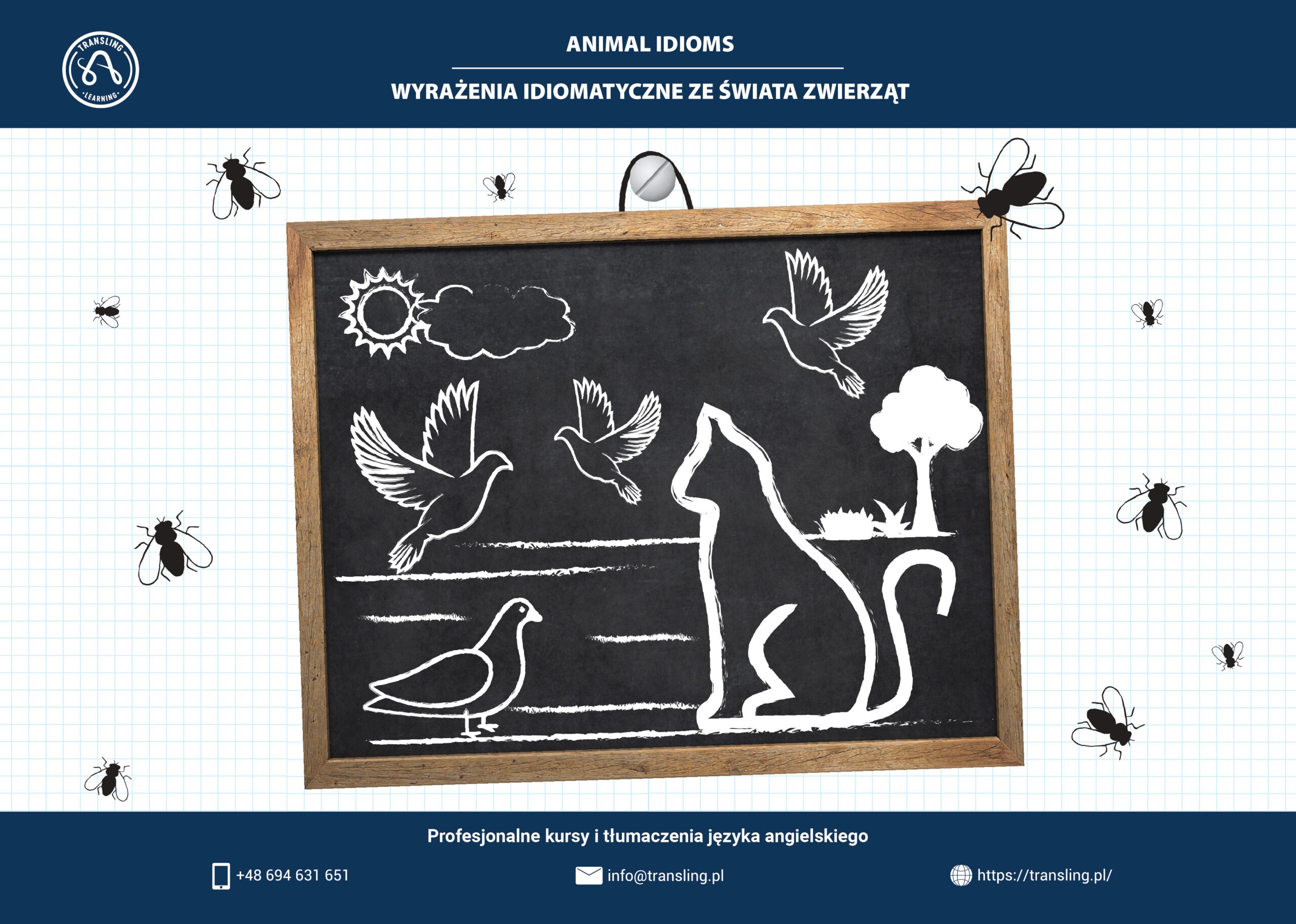Wyrażenia idiomatyczne ze świata zwierząt
Animal idioms
W języku angielskim istnieje wiele idiomów, przysłów i powiedzeń nawiązujących do świata zwierząt; można zaryzykować stwierdzenie, że jest ich jeszcze więcej niż w języku polskim.
W poniższym materiale przyjrzymy się bliżej kilku dość często używanym wyrażeniom idiomatycznym wraz z objaśnieniami i przykładami oraz ćwiczeniem sprawdzającym przeanalizowany materiał.
There are many idioms, proverbs and sayings referring to animals in English, and we can hazard a guess that there are even more of them than in the Polish language.
In the material below, we will have a closer look at some quite frequently used idiomatic expressions, together with their explanations and examples, as well as an exercise based on the analysed material for a self-check.

Put the cat among the pigeons = to say or do something that causes trouble or makes a lot of people very angry (powodować problemy, wsadzić kij w mrowisko)
e.g. I wouldn’t do that if I were you. If we ask him to change his mind and refuse this offer, we will only put the cat among the pigeons and make the whole situation even worse.

(Like) water off a duck’s back = criticisms of or warnings to a particular person that have no effect on that person (jak woda po kaczce)
e.g. I’ve told him many times not to do that, but he won’t listen. – It’s just like water off a duck’s back.

Let the cat out of the bag = to allow a secret to be known, usually without intending to (zdradzić tajemnice, puścić parę z ust, wygadać się)
e.g. I was trying to keep it secret but when Peter came in, he simply let the cat out of the bag and everybody found out what our plans were.

Dog in the manger = someone who keeps something that they don’t want in order to prevent someone else from getting it (pies ogrodnika)
e.g. Don’t be a dog in the manger. If you don’t need this old bike any more, why don’t you give it to your brother or someone else to use it?

Donkey’s years = a very long time (bardzo długo)
e.g. I haven’t seen my cousin Anne for donkey’s years. I wonder how she has changed since the last time I saw her.

It’s the last straw that broke / breaks the camel’s back = the latest problem in a series of problems that makes a situation impossible to accept (przelać czarę goryczy, być ostatnią kroplą w czarze goryczy, przebrać miarkę)
e.g. He hasn’t had much luck recently. He has lost a lot of money on the stock market and had his car stolen, but it was the last straw that broke the camel’s back when his boss announced yesterday that he was going to fire him after 15 years.

Smell a rat = to recognise that something is not as it appears to be or that something dishonest is happening or is going to happen (przeczuwać coś złego, czuć, że coś się święci)
e.g. I wonder why he’s been spending so much time with those people. I smell a rat.

A wolf in sheep’s clothing = a person with a pleasant and friendly appearance that hides the fact that they are evil (wilk w owczej skórze)
e.g. I wouldn’t trust him. When you spend more time with him, you will clearly notice that he is just a wolf in sheep’s clothing. It seems that appearances are really misleading.

It’s raining cats and dogs = it’s raining heavily (leje jak z cebra) e.g. It’s been raining cats and dogs since last night. I hope there won’t be any flood in the area.

Flog a dead horse = waste time and effort on something useless when there is no chance of succeeding (trudzić się na próżno, niepotrzebnie tracić czas i energię na straconą sprawę)
e.g. He keeps asking his boss for a pay rise but it’s like flogging a dead horse as it’s almost unlikely to happen.

Like a bull in a china shop = very careless in the way someone moves or behaves (jak słoń w składzie porcelany i.e. zachowywać się niezgrabnie, nieporadnie)
e.g. Try to be more gentle and stop behaving like a bull in a china shop, you might break all the glass on the table.

Have a whale of a time = to have a great time (świetnie się bawić)
e.g. You should really go to that party next weekend. You’re going to have a whale of a time and you might even meet someone.

Have a bee in one’s bonnet = to be obsessed with / crazy about something (mieć bzika na punkcie czegoś)
e.g. Frank has a bee in his bonnet about fitness and healthy food. He keeps talking about it all the time.

Be a fly on the wall = to hear what will be said or see what will happen while not being noticed (móc podsłuchiwać, być niezauważonym obserwatorem lub słuchaczem)
e.g. I would like to be a fly on the wall during the meeting next Friday. I just want to hear everything without being involved.

The lion’s share = the largest part or most of something (lwia część)
e.g. He spends the lion’s share of his income on travelling and eating out.

Eager beaver = someone who is willing to work very hard (bardzo pracowita osoba, skora do pracy)
e.g. He is a real eager beaver. He can easily do overtime and work extra hours even at weekends.

As busy as a bee = very busy, working very hard (bardzo zajęty, pracujący jak dziki osioł, pracowity jak pszczoła)
e.g. She is still able to find time for her friends and extra hobbies even though she’s as busy as a bee.

What’s good for the goose is good for the gander / What’s sauce for the goose is sauce for the gander = everyone should be treated in the same way; if others have the right to do sth, I can also do it; if something is good for one, should be good for all (skoro inni mogą coś robić to ja też, wszyscy powinni być traktowani tak samo)
e.g. Why do you think I can’t take part in this event? It’s not fair – what’s good for the goose is good for the gander.
EXERCISE
A teraz czas sprawdzić ile udało się zapamiętać z przestudiowanego powyżej materiału.
Należy uzupełnić poniższe zdania brakującymi nazwami zwierząt aby otrzymać poprawne wyrażenia idiomatyczne w języku angielskim.
And now it’s time to check how much you managed to remember from the material studied above. Please complete the sentences below with the missing animal names to get the correct idiomatic expressions in English.
Even though she’s as busy as a …………., she is still able to find time for her friends and extra hobbies
He used to be a real eager ……………… Now he works only from 9 to 5 and doesn’t want to work any minute longer.
I was trying to keep it secret but he just let the ……….. out of the bag and now everybody knows when we’re going to get married.
He spends the …………’s share of his salary on food and hobbies.
Kevin has a ………in his bonnet about travelling and visiting new places. He can’t stop talking about his previous and future adventures.
It’s been raining ………. and ……….. since yesterday. Let’s hope there won’t be any local flooding.
I wouldn’t trust this man. He is just a ……….. in ………..’s clothing.
She has been looking for a better job for ………….’s years. I hope she’ll find it soon.
There’s no point in speaking to him, he won’t listen. – It’s just like water off a ……….’s back.
He’s been coming back home later than usual recently. I smell a ……… .
Animal idioms_EXERCISE plik do pobrania

